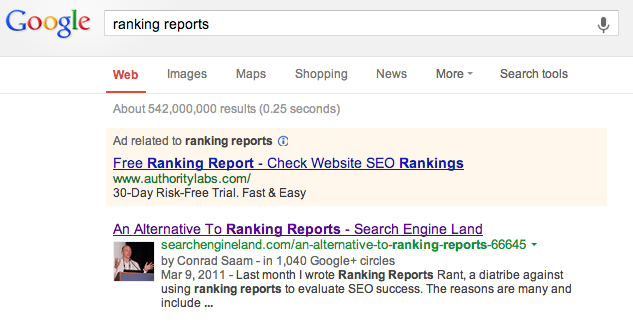A Common Sense Law Firm Policy for Authorship
Authorship is the hottest new innovation in search. And like many changes that preceded it, authorship has the legal community spinning in circles trying to figure out what to do.
But first . . .
A Quick Primer on Authorship
At a very high level, authorship is the association of an individual writer’s reputation to a piece of content. This manifests itself in two important ways. 1. As a ranking factor – i.e. Conrad Saam has accrued a strong reputation for writing about search and therefore his content about search will rank well regardless of where it is published. 2. As a click through factor – to help searchers identify good content, Google is including a thumbnail of the author in search results.
Authorship is a big deal. At the latest SMX Advanced conference, a study (with what looked like an admittedly anemic dataset) claimed a 200% increase in clicks to results with authorship than without, regardless of position on the SERP. Later in the same session, a major newspaper editor suggested that a writer’s Author Rank (uggg – our industry’s latest nauseating buzzword that is soon going to be misused by MBAs desperate to display some tech cred) would soon be a primary hiring factor.
Authorship has been written about ad nauseam – I’d recommend Ann Smarty’s cheat sheet overview if you need to quickly get caught up. For now, I want to focus on the perceived risks of authorship . . .
Why Law Firms are Afraid of Authorship
Authorship does raise some genuine questions. To capture search traffic, more and more law firms are expanding the velocity at which they publish content to the web – using more firm lawyers, or with ghost written content. This has raised policy issues around authorship. The two most common concerns that have some law firms completely balking wrt to authorship are:
“What if I publish something that could be used against me down the road in a case?”
This red herring actually has nothing to do with authorship. The logic is pretty simple –something published on your law firm’s blog that is so damaging is probably not going to be more so with a picture attached to the results on a search engine query. I hear this concern mostly from law firms using outsourced third parties to vomit out a huge volume of low quality content onto their sites. If this is a question you find yourself asking – consider fixing the content problem, not the authorship problem.
“What happens if Bill leaves my firm – can he take his authorship with him?”
This is more nuanced question and mirrors a common firm partner concern: I spend year’s building Mary’s reputation as a great lawyer, and then she goes and opens up a firm across the street from me. Allaying this concern requires an understanding of how authorship works. Let’s go back to the central premise of authorship: content for reputable writers ranking regardless of where it is published. So, yes, a lawyer can build up their writing reputation on a firm’s blog and then put that reputation in their pocket and start a new firm with a new website and leverage that reputation to rank. From an Author Rank perspective two things happen here: 1)as their reputation builds on their new site, so does the value of that reputation to the original content and 2)if they choose to disassociate themselves from the original blog, they lose the value of that reputation. It is important to note that reputation isn’t built just because I’m writing on a specific blog, but also because of many additional associated signals (links, shares, etc.). Just like in real life, the reputation for an author (or lawyer, or singer, or SEO consultant) transcends any individual publishing platform. Therefore, there is no downside to using authorship to enhance your content’s ability to drive traffic.
This brings us to . . .
A Common Sense Law Firm Policy for Authorship:
Don’t publish anything you wouldn’t attach your name to.

